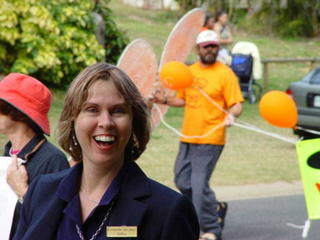"Knowledge sharing" at the source - trainees teach the trainers
Yesterday I witnessed something truly wonderful in the library.
First a bit of background information. We have been "using" trainee library assistants for five years to bolster our (tiny) staff numbers. They come to us for one year, work and learn on the job, and leave us with a basic certificate qualification. It is really awful when it is time to turn over the trainees - in most cases, they have become valued members of the team and it seems pretty heartless to unceremoniously replace them each year (they often induct their own replacements!). However, the good news is that we have been able to retain most of our trainees as support staff. However I digress.
Three of our permanent library assistants are also pursuing higher certificate courses. Two of these are near the end of the course and are completing a module on "multi media". One of their tasks is to produce a simple Powerpoint presentation about some aspect of the library service. Neither of these seasoned staffers have ever used Powerpoint. And this is what I saw that so affected me:
As I was wandering through the cataloguing room I saw one of the trainees and one of the library assistants hunched over a computer. The trainee, a mature aged lady who knows how Powerpoint works because she previously worked in a school environment (my 8 year old has just completed a Powerpoint project but I digress again), was guiding the permanent staff member through the steps. They were so intense in this task that they barely noticed me going by.
I continued on into my office which I had given over to the other library assistant so that she could use my computer (did I mention our library is really small?) and there the scene was repeated with another trainee, this time a 16 year old fresh out of high school, teaching our longest serving staff member how to do Powerpoint. And I thought (later) that this was an excellent example of spontaneous, non-hierarchical "knowledge sharing" which could be an analogy for how libraries do/could/should facilitate the sharing of knowledge in their communities.
A colleague from another section once asked whether we trained our trainees or exploited them. I replied without hesitation "both". But I hope we exploit them in the nicest way.
First a bit of background information. We have been "using" trainee library assistants for five years to bolster our (tiny) staff numbers. They come to us for one year, work and learn on the job, and leave us with a basic certificate qualification. It is really awful when it is time to turn over the trainees - in most cases, they have become valued members of the team and it seems pretty heartless to unceremoniously replace them each year (they often induct their own replacements!). However, the good news is that we have been able to retain most of our trainees as support staff. However I digress.
Three of our permanent library assistants are also pursuing higher certificate courses. Two of these are near the end of the course and are completing a module on "multi media". One of their tasks is to produce a simple Powerpoint presentation about some aspect of the library service. Neither of these seasoned staffers have ever used Powerpoint. And this is what I saw that so affected me:
As I was wandering through the cataloguing room I saw one of the trainees and one of the library assistants hunched over a computer. The trainee, a mature aged lady who knows how Powerpoint works because she previously worked in a school environment (my 8 year old has just completed a Powerpoint project but I digress again), was guiding the permanent staff member through the steps. They were so intense in this task that they barely noticed me going by.
I continued on into my office which I had given over to the other library assistant so that she could use my computer (did I mention our library is really small?) and there the scene was repeated with another trainee, this time a 16 year old fresh out of high school, teaching our longest serving staff member how to do Powerpoint. And I thought (later) that this was an excellent example of spontaneous, non-hierarchical "knowledge sharing" which could be an analogy for how libraries do/could/should facilitate the sharing of knowledge in their communities.
A colleague from another section once asked whether we trained our trainees or exploited them. I replied without hesitation "both". But I hope we exploit them in the nicest way.



